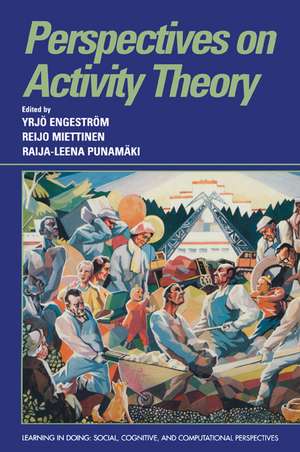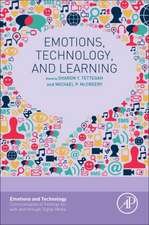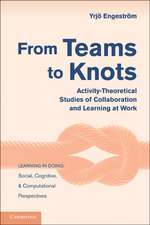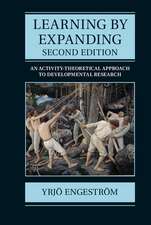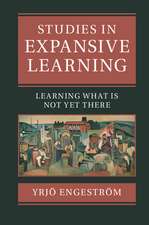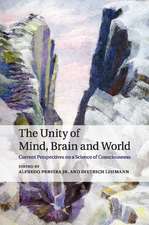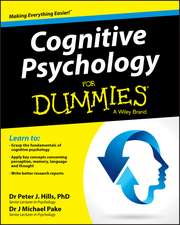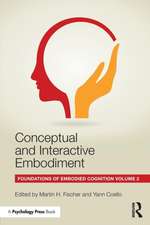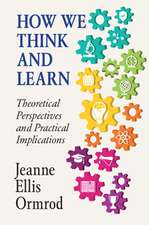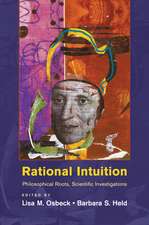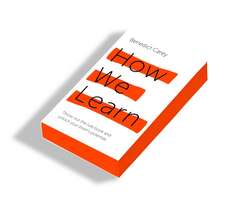Perspectives on Activity Theory: Learning in Doing: Social, Cognitive and Computational Perspectives
Editat de Yrjö Engeström, Reijo Miettinen, Raija-Leena Punamäkien Limba Engleză Paperback – 12 ian 1999
| Toate formatele și edițiile | Preț | Express |
|---|---|---|
| Paperback (1) | 459.10 lei 43-57 zile | |
| Cambridge University Press – 12 ian 1999 | 459.10 lei 43-57 zile | |
| Hardback (1) | 872.18 lei 43-57 zile | |
| Cambridge University Press – 12 ian 1999 | 872.18 lei 43-57 zile |
Din seria Learning in Doing: Social, Cognitive and Computational Perspectives
-
 Preț: 311.66 lei
Preț: 311.66 lei - 9%
 Preț: 695.96 lei
Preț: 695.96 lei -
 Preț: 319.43 lei
Preț: 319.43 lei -
 Preț: 228.66 lei
Preț: 228.66 lei -
 Preț: 201.39 lei
Preț: 201.39 lei - 11%
 Preț: 493.04 lei
Preț: 493.04 lei -
 Preț: 281.88 lei
Preț: 281.88 lei -
 Preț: 431.40 lei
Preț: 431.40 lei - 14%
 Preț: 900.82 lei
Preț: 900.82 lei -
 Preț: 326.53 lei
Preț: 326.53 lei -
 Preț: 346.50 lei
Preț: 346.50 lei -
 Preț: 296.65 lei
Preț: 296.65 lei -
 Preț: 292.45 lei
Preț: 292.45 lei - 20%
 Preț: 279.91 lei
Preț: 279.91 lei -
 Preț: 357.13 lei
Preț: 357.13 lei - 11%
 Preț: 526.58 lei
Preț: 526.58 lei - 14%
 Preț: 784.65 lei
Preț: 784.65 lei -
 Preț: 320.66 lei
Preț: 320.66 lei - 11%
 Preț: 512.98 lei
Preț: 512.98 lei -
 Preț: 332.97 lei
Preț: 332.97 lei - 11%
 Preț: 690.80 lei
Preț: 690.80 lei - 11%
 Preț: 444.70 lei
Preț: 444.70 lei -
 Preț: 324.15 lei
Preț: 324.15 lei -
 Preț: 350.97 lei
Preț: 350.97 lei -
 Preț: 392.00 lei
Preț: 392.00 lei - 20%
 Preț: 516.51 lei
Preț: 516.51 lei -
 Preț: 330.33 lei
Preț: 330.33 lei - 14%
 Preț: 786.15 lei
Preț: 786.15 lei - 5%
 Preț: 321.87 lei
Preț: 321.87 lei -
 Preț: 350.21 lei
Preț: 350.21 lei -
 Preț: 321.27 lei
Preț: 321.27 lei - 14%
 Preț: 726.60 lei
Preț: 726.60 lei -
 Preț: 339.96 lei
Preț: 339.96 lei
Preț: 459.10 lei
Preț vechi: 515.84 lei
-11% Nou
Puncte Express: 689
Preț estimativ în valută:
87.85€ • 91.95$ • 73.12£
87.85€ • 91.95$ • 73.12£
Carte tipărită la comandă
Livrare economică 31 martie-14 aprilie
Preluare comenzi: 021 569.72.76
Specificații
ISBN-13: 9780521437301
ISBN-10: 052143730X
Pagini: 480
Ilustrații: 55 b/w illus. 3 tables
Dimensiuni: 155 x 229 x 25 mm
Greutate: 0.65 kg
Ediția:New.
Editura: Cambridge University Press
Colecția Cambridge University Press
Seria Learning in Doing: Social, Cognitive and Computational Perspectives
Locul publicării:New York, United States
ISBN-10: 052143730X
Pagini: 480
Ilustrații: 55 b/w illus. 3 tables
Dimensiuni: 155 x 229 x 25 mm
Greutate: 0.65 kg
Ediția:New.
Editura: Cambridge University Press
Colecția Cambridge University Press
Seria Learning in Doing: Social, Cognitive and Computational Perspectives
Locul publicării:New York, United States
Cuprins
Part I. Theoretical Issues: 1. Activity theory and individual and social transformation Yrjo Engeström; 2. The content and unsolved problems of activity theory Vassily V. Davydov; 3. Knowledge as shared procedures Stephen Toulmin; 4. Activity theory in a new era Vladimir A. Letkorsky; 5. Society versus context in individual development: does theory make a difference? Charles W. Tolman; 6. Cultural psychology: some general principles and a concrete example Michael Cole; 7. Laws logics and human activity Antti Eskola; 8. Collapse creation and continuity in Europe - how do people change? Yrjo-Paavo Hayrynen; 9. Activity theory and the concept of integrative levels Eythel Tobach; 10. The relevance to psychology of Antonio Gramsci's ideas on activity and common sense Francesco Paolo Colucci; Part II. Language and its Acquisition: 11. The expanded dialogic sphere: writing activity and authoring of self in Japanese classrooms Yuji Moro; 12. Improvement of school children's reading and writing ability through the formation of linguistic awareness Kyoshi Amano; 13. Psychomotor and socio-emotional processes in literacy acquisition: results from an ongoing case study involving a nonvocal cerebral palsic young man Matthias Bujarski Martin Hildebrand-Nilshon and Jane Kordt; Part III. Play Learning and Instruction: 14. Play and motivation Pentti Hakkarainen; 15. Drama games with six year old children: possibilities and limitations Stig Brostrom; 16. Activity formation as an alternative strategy of instruction Joachim Lompscher; 17. Activity theory and historic teaching Mariane Hedegaard; 18. Didactic models and the problem of intertextuality and polyphony Jacques Carpay and Bert Van Oers; 19. Metaphor and learning activity Bernd Fichtner; 20. Transcending traditional school learning: teachers' work and networks of learning Reijo Miettinen; Part IV. Technology and Work: 21. The theory of activity changed by information technology Oleg K. Tikhomirov; 22. Activity theory transformation of work and information systems design Kari Kuutti; 23. Innovative learning in work teams: analyzing cycles of knowledge creation in practice Yrjö Engeström; Part V. Therapy and Addiction: 24. Object relations theory and activity theory: a proposed link by way of the procedural sequence model Anthony Ryle; 25. The concept of sign in the work of Vygotsky, Winnicott and Bakhtin: further integration of object relations theory and activity theory Mikael Leiman; 26. From addiction to self-governance Anja Koski-Jannes.
Descriere
An international, interdisciplinary overview of research on activity theory, first published in 1999.
